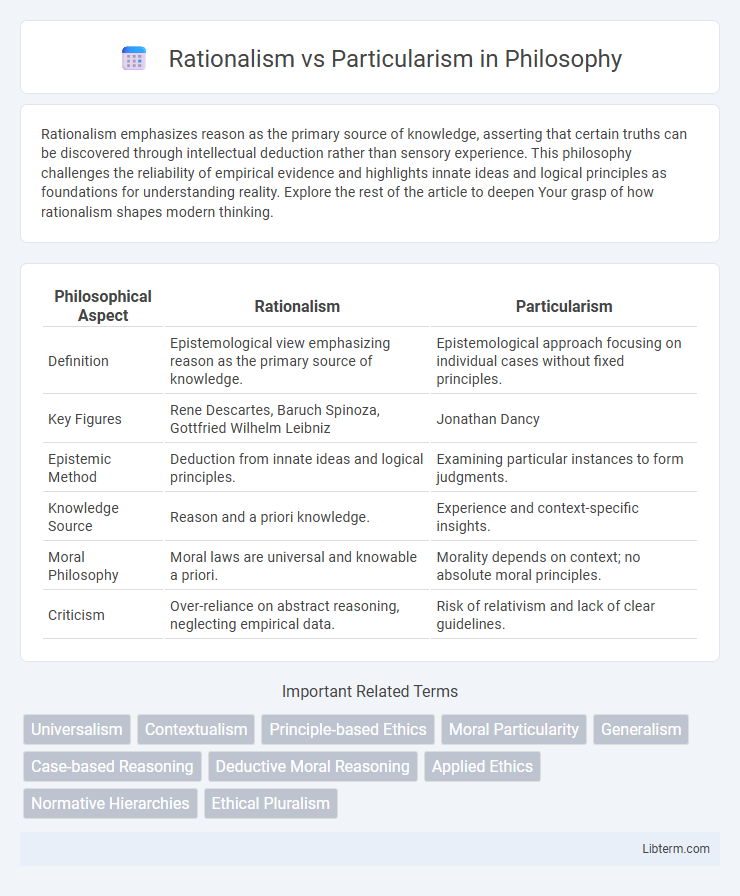Rationalism emphasizes reason as the primary source of knowledge, asserting that certain truths can be discovered through intellectual deduction rather than sensory experience. This philosophy challenges the reliability of empirical evidence and highlights innate ideas and logical principles as foundations for understanding reality. Explore the rest of the article to deepen Your grasp of how rationalism shapes modern thinking.
Table of Comparison
| Philosophical Aspect | Rationalism | Particularism |
|---|---|---|
| Definition | Epistemological view emphasizing reason as the primary source of knowledge. | Epistemological approach focusing on individual cases without fixed principles. |
| Key Figures | Rene Descartes, Baruch Spinoza, Gottfried Wilhelm Leibniz | Jonathan Dancy |
| Epistemic Method | Deduction from innate ideas and logical principles. | Examining particular instances to form judgments. |
| Knowledge Source | Reason and a priori knowledge. | Experience and context-specific insights. |
| Moral Philosophy | Moral laws are universal and knowable a priori. | Morality depends on context; no absolute moral principles. |
| Criticism | Over-reliance on abstract reasoning, neglecting empirical data. | Risk of relativism and lack of clear guidelines. |
Introduction to Rationalism and Particularism
Rationalism emphasizes adherence to fixed principles or universal rules in ethical decision-making, prioritizing consistency and objective standards. Particularism rejects rigid rules, asserting that moral judgments depend on the context of individual situations, highlighting the importance of nuances and specific details. This debate centers on whether morality is best understood through general principles or the particularities of each case.
Defining Rationalism: Core Principles
Rationalism is a philosophical doctrine emphasizing reason as the primary source of knowledge, asserting that certain truths can be known independently of sensory experience. Core principles include the reliance on innate ideas, deductive reasoning, and the belief in universal, objective standards that guide ethical and epistemological judgments. This approach contrasts with empirical methods by prioritizing mental constructs and logical coherence over data from particular instances.
Particularism Explained: Key Concepts
Particularism emphasizes the importance of context and specific details over universal principles, asserting that moral judgments depend on the particularities of each situation. It rejects fixed rules or absolute standards, arguing that ethical decisions must be made based on the unique circumstances and relationships involved. Central concepts include situational specificity, moral flexibility, and the rejection of one-size-fits-all ethical theories.
Historical Roots and Philosophical Background
Rationalism, rooted in the Enlightenment era, emerged from the works of philosophers like Descartes and Spinoza who emphasized reason as the primary source of knowledge, stressing universal principles and logical deduction. Particularism, influenced by thinkers such as David Hume and later pragmatists, challenges rationalism by highlighting the importance of context, experience, and particular cases over abstract generalizations. The philosophical background of this debate centers on the tension between universal, a priori knowledge and empirical, context-dependent understanding in epistemology and ethics.
Rationalism vs Particularism: Key Differences
Rationalism emphasizes universal principles and objective reasoning as the foundation for decision-making, while particularism prioritizes context-specific judgments and situational factors. Rationalists seek consistency and coherence across cases, applying general rules to guide actions, whereas particularists argue that moral decisions depend on unique circumstances and cannot be fully captured by fixed principles. The key difference lies in rationalism's reliance on abstract, generalizable norms versus particularism's focus on the nuanced complexity of individual scenarios.
Major Thinkers and Influential Theories
Rationalism, championed by Rene Descartes and Baruch Spinoza, emphasizes reason as the primary source of knowledge, advocating for universal principles and innate ideas that guide moral and epistemological understanding. Particularism, supported by philosophers like Jonathan Dancy, rejects fixed moral principles, arguing that moral judgment depends on the context and the specific details of individual cases rather than overarching rules. Major theories within rationalism include Descartes' methodological doubt and Spinoza's substance monism, while particularism centers on contextual sensitivity and moral particularity, challenging the rigidity of moral absolutism.
Applications in Ethics and Moral Reasoning
Rationalism in ethics emphasizes universal principles and logical consistency, guiding moral reasoning through objective rules applicable to all situations. Particularism rejects fixed ethical principles, arguing that moral judgment depends on the specifics of each case, highlighting context-sensitive decision-making. Applications in moral reasoning reveal rationalism supports creating standardized ethical codes, while particularism promotes flexibility and responsiveness to unique ethical dilemmas.
Strengths and Weaknesses of Each Approach
Rationalism offers the strength of universal principles and consistent decision-making, promoting predictability and fairness across diverse contexts, but its rigidity can overlook nuanced, context-specific factors. Particularism excels in flexibility and sensitivity to unique situations, allowing for tailored ethical judgments, yet risks inconsistency and subjective bias due to the absence of fixed guidelines. Balancing the systematic clarity of rationalism with the adaptive responsiveness of particularism remains a critical challenge in ethical theory and practical application.
Contemporary Debates and Real-World Implications
Contemporary debates on rationalism versus particularism center on the tension between universal principles and context-specific considerations in moral and epistemic reasoning. Rationalism advocates for the application of consistent, overarching rules, while particularism emphasizes the primacy of situational variables and nuanced judgment. Real-world implications of this debate manifest in legal systems, policy-making, and ethical decision-making, where the balance between standardized norms and individualized circumstances shapes outcomes and legitimacy.
Conclusion: Finding Common Ground or Irreconcilable Divide
Rationalism emphasizes universal principles guiding moral reasoning, while Particularism prioritizes context-specific judgments over fixed rules. Finding common ground involves recognizing that ethical decision-making benefits from both general frameworks and sensitivity to situational nuances. This balanced perspective can reconcile the apparent divide by integrating systematic analysis with attentiveness to particularities in ethical contexts.
Rationalism Infographic

 libterm.com
libterm.com